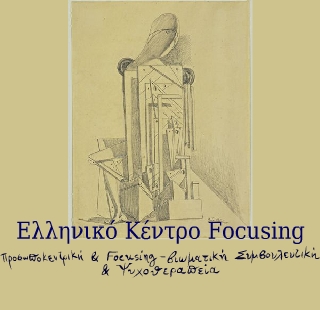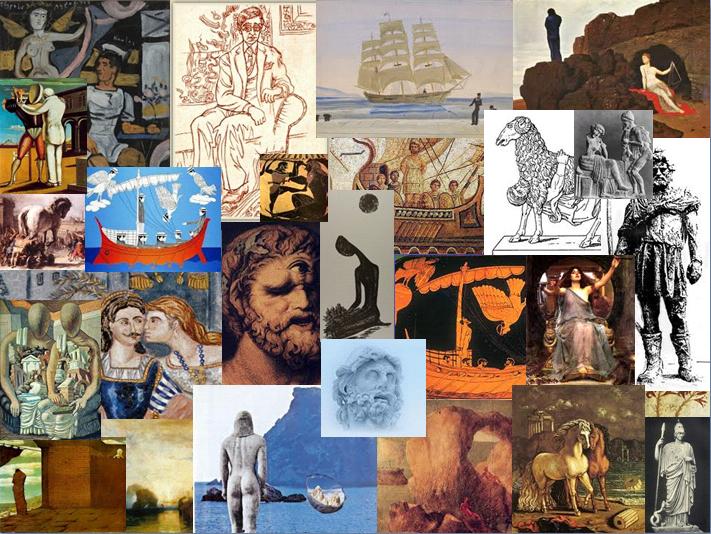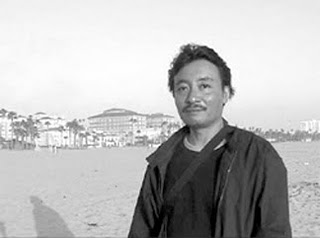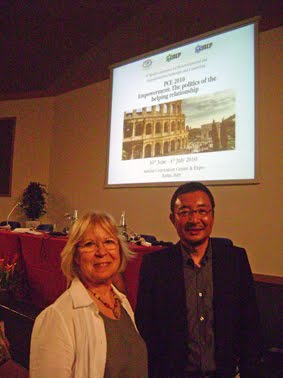
Οι ρίζες βέβαια δεν φαίνονται,
όμως το ξέρεις,
σ'αυτές κρατιέται το δέντρο ...
Γιάννης Ρίτσος, "Τα χάρτινα"

Οι ρίζες βέβαια δεν φαίνονται,
όμως το ξέρεις,
σ'αυτές κρατιέται το δέντρο ...
Γιάννης Ρίτσος, "Τα χάρτινα"
 |
In 2001, the HFC began its activities in the psychological health field,
of the Person-Centred and Focusing-Oriented Counselling and Psychotherapy in Greece. Read
καθώς και για: news and announcements
|
The main activities of the Hellenic Focusing Centre are:
The Hellenic Focusing Centre acknowledges that all people deserve a therapy according to the individuality of their reactions and experiences.
It believes that each person is entitled to a safe, discrete and effective therapeutic approach, which, at the same time, must respect their right to fully control their therapeutic process.
Hence, it trains counselors/psychotherapists according to the humanistic principles and the directions and philosophy of the Person-Centred and Focusing-Oriented Psychotherapy.
Furthermore, it supports its trainees for the development of their empathy, skills and experiences in order to be able to help vulnerable groups or people in the best possible way, depending on their particular needs at a social or personal level.
It supports its trainees in their attempt to establish Person-Centred and Focusing-Oriented Counselling and Psychotherapy in their work environment.
Those in charge of the Centre work within an atmosphere of respect, comradeship, cooperation and good will between all the members, the colleagues, trainers and trainees of the Centre.
The trainees are provided with the Code of Ethics and Counselling Practice
of the Greek Association for Counselling as it appears on its official website.
The training of the HFC is certified by The International Focusing Institute of New York, U.S.A and recognised by
| Directors | Anna Karali Pavlos Zarogiannis |
| Directors | Anna Karali Pavlos Zarogiannis |
| Trainers and Training Committee |
Anna Karali Pavlos Zarogiannis Ireni Davleri Emmanuel Vantarakis |
| Trainers in training | Pat Foster Sofia Papoutsi Marika Rellou Aglaia Mastrokalou Eirini Xanthopoulou |
| Associates | Campbell Purton Ph.D (U.K.) Dieter Mueller (Germany) Greg Madison Ph.D (U.K.) Michael Seibel Lousirena Papadopoulou |
| Supervision Administrators | Anna Karali Pavlos Zarogiannis |
| Financial Administrators | Anna Karali Pavlos Zarogiannis |
| Ethics Committee | Anna Karali Pavlos Zarogiannis Emmanuel Vantarakis |
| Administrative Secretariat | Jenny Anagnostopoulos |
| Web Administrator | Nikolaos Kypriotakis |
The Hellenic Focusing Centre has created an integrated professional training specialised in Person-Centred and Focusing-Oriented Counselling and Psychotherapy. This implies that this training offers the general framework which enables the trainees to cultivate and develop all the essential theoretical, practical and personal skills in order to be able to work as independent Person-Centred and Focusing-Oriented Counsellors and Psychotherapists.
The trainees, having successfully completed the training and fulfilled the additional required criteria, can:
The main objective of this training is the adequate and complete training of future Counsellors and Psychotherapists, who will be capable of exercising the relevant professions with self-awareness, accountability and scientific background. For this reason, the personal development of the trainees is considered an integral part of the training process, which is implemented under supervision by combining this personal development with counselling/psychotherapeutic skills and theoretical knowledge.
Hence, the training is based on the following main components:
The main objective of the training is the personal development of the trainee so that they can obtain the professional status of a Person-Centred and Focusing-Oriented Counsellor/Psychotherapist, based on:
Person-Centred & Focusing-Oriented Counselling and Psychotherapy signifies a creative combination of two practically parallel approaches: Person-Centred and Focusing-Oriented. Although these two approaches share a common background and a partly common present, after some point they followed parallel paths, which sometimes appear to be complementary, competitive or even opposite.
Always taking into account the differences and particularities of these two approaches, in the Hellenic Focusing Centre we intent to focus on their common and complementary points, on-going communication, interactions, development and evolution by means of training, therapeutic activities and supervision.
The theoretical framework of the training is influenced by the Phenomenology and Existentialism philosophical schools of thought. Moreover, it is based on the scientific principles of Humanistic Psychology, since both the Person-Centred and the Focusing-Oriented approaches belong to the wider field of Humanistic Psychology, the so called “third path” of psychology. This path appeared and was developed after the Second World War as an alternative approach to the dominant schools of thought in these days, i.e. psychoanalysis and behaviourism.
As mentioned, Humanistic Psychology has its theoretical origins on Phenomenology and Existentialism. In the core of these two philosophical schools of thought of the 20th century lies the unique and always individual human being with a very personal, subjective and, thus, an unprecedented perception and meaning of the world and himself.
It is exactly this subjective truth, with all its facets, shadings and nuances, as well with its denials and distortions that the Person-Centred and Focusing-Oriented Counselling and Psychotherapy aims to understand.
Hence, this special psychotherapeutic approach does not attempt to give a technocratic, one-directional scientific explanation of any human condition, but its full comprehension with all its potentials and limits. It is this profound respect towards the human being per se that inspires this specific attitude contrary to any other alternative.
Therefore, Person-Centred and Focusing-Oriented Counselling and Psychotherapy does not define and develop diagnostic tools and therapeutic techniques that would implicitly use the individual as a research object or an object for interpretation and analysis. On the contrary, the main objective of this approach is to develop attitudes, views and qualities that enable the counsellor/psychotherapist to approach clients as unique and distinct persons. Through this encounter, the client in turn is given the chance to meet with their own self, to accept their individuality, to relate with themselves and to be able to relieve themselves from undesirable behaviours and/or unpleasant and hurtful symptoms.
Similarly, the Person-Centred and Focusing-Oriented approach understands and takes into account its role and position among the rest of the therapeutic approaches. It by no means considers that it possesses the absolute truth for the human being, but that it offers to the individual a special, unique and different theory with potential as well as limitations.
The founder of the Person-Centred Theory is Carl R. Rogers, the first psychologist who stated and developed a distinct psychotherapeutic approach. During its evolution, the Person-Centred Approach has gone through several phases before reaching its final form:
The Person-Centred Approach considers the individual as a unique, complex, organic whole, which is ruled by an intrinsic and dominant force, or energy, the so-called “actualising tendency”. This actualising tendency guides the organism, through development, improvement and differentiation, towards the actualisation of its potential and its eventual integration.
Person-Centred Counselling and PsychotherapyWithin this theoretical framework, the person-centred counsellor/psychotherapist is asked to support and facilitate the client to connect to this actualising tendency, and allow it to be developed and cultivated.
In order for this to be accomplished, the person-centred counsellor/psychotherapist is required to create and maintain a genuine therapeutic relationship with the client, which is to be sustained by means of safety, respect and trust. This relationship should be based on three therapeutic conditions, which Carl Rogers considered to be necessary and sufficient for a therapeutic change: empathy, unconditional positive regard and congruence.
Summarizing, the main characteristics of the Person-Centred Counselling and Psychotherapy are:
If the person-centred counsellor/psychotherapist manages to create a relationship with the client under these three conditions, then there is a great possibility for the client to broaden their internal frame of reference, resulting to a better understanding of their self and a greater self-acceptance, which will promote their further development and psychological health.
The core of the Focusing-Oriented Approach is the direct and continuous experiencing, i.e. all that we experience in every moment (which flows and changes constantly) as well as the way we relate to it.
We are not usually open to our direct and continuous experiencing. We have not learnt to be open to it, to accept it and to symbolise it appropriately. Most of the times, our relation with our experiencing is limited, distorted, sometimes solid, constraining inflexible, and thus, repeated. Consequently, our lives consist of commonly repeated events that lose their experiential depth, and are not transformed into experiences. As a result our personal development is impeded, and does not advance according to our deepest needs and desires; it may even get traumatized –to a larger or smaller extent- depending on our personal path.
In order to be able to remove these blocks, and to facilitate our personal development, what is needed, according to Gendlin, is to improve our relation with our experiencing or to restore it in case it has been interrupted. For this reason, Gendlin suggests Focusing as a facilitator to connect or reconnect with the experiencing.
With Focusing we turn our attention to our body –as we feel it inside- in order to obtain a felt sense of the situation we experience.
At this point, it must be emphasized that according to the Focusing philosophy body, environment, situation and experiencing are in constant interaction, and form an inseparable whole. The body is not just a machine with certain functions but the primary organ with which we meet the world and relate to it. The body is in constant interaction with the environment and caries implicit information, not yet symbolized, relevant to what it experiences here and now. In that sense, the body implies the experiencing and for this reason the body knows.
The main characteristics of Focusing-Oriented Counselling and Psychotherapy are:
Additionally, a core concept in the theory and practice of the Focusing-Oriented Approach, and consequently of the Focusing-Oriented Counselling and Psychotherapy, is the term felt sense.
Through Focusing, the client comes in contact with a special form of bodily knowledge. This knowledge is referred to as felt sense. It must be noted that the felt sense does not exist in advance, but is being formed during focusing, i.e. when the clients turn their attention to their body, which implies information related to the situation or the problem it experiences.
The felt sense bears the following characteristics:
This material enhances the current emotional and intellectual knowledge, and comprises the basis for therapeutic change. The client, having the bodily-felt sense as a “compass,” can gradually be connected or reconnected to their experiencing, obtain access to it, derive information and find new meanings related to it, and finally be led to possible changes in their lives.
The whole training course is completed within three (3) years.
(ask HFC, for details)
The whole training course is completed within four (4) years.
(ask HFC, for details)
It has already been emphasised that the training course of the Hellenic Focusing Centre is mainly experiential. This also applies to the theoretical foundations of the trainees are not built by mere theory teaching, but are personally experienced.
1st year
1st Semester: Introduction to the Person-Centred Approach2nd year
3rd Semester: The Theory of Personality in the Person-Centred Approach3rd year
5th Semester: Introduction to Focusing-Oriented Therapy (FOT): Therapy Theory4th year
7th Semester: Present trends in Person-Centred ApproachFocusing was developed in the ‘70s by the philosopher and psychotherapist Dr. Eugene T. Gendlin, a professor at the University of Chicago, as the result of clinical research and psychotherapeutic experience.
Specifically, Carl R. Rogers asked his close colleague, E.T. Gendlin, to investigate the factors that would positively influence the outcomes of psychotherapy.
The starting hypothesis to be examined was “how is it that psychotherapy helps some people more than others.” E.T. Gendlin and his colleagues studied hundreds of taped psychotherapeutic sessions and they reached an important conclusion: “The improvement of the psychological condition of those clients that completed a psychotherapeutic cycle was independent of the psychotherapeutic approach used by the therapist, as well as the ‘content’ of the therapeutic sessions.” The success of the therapy seemed to depend on the clients who shared some common characteristics such as:
All these characteristics proved to be the most important “tool” for a successful psychological change, which seemed to occur naturally for some of the clients while for others was totally absent.
It was this “absence” that E.T. Gendlin tried to cover by creating and developing Focusing as a skill that could be used by most of the clients to benefit from the psychotherapeutic process.
In 1978, E.T. Gendlin published his book titled “Focusing”, in which he described in detail the Focusing Process, as a technique of discrete steps that can be followed by both specialists and lay persons as a process of self-awareness and self-therapy.
It is emphasised that the Focusing Process is not a mere technique. Based on Focusing, a distinct philosophical view as well as a scientific approach has been developed over the years, which can be applied to many different fields, such as:
more information: www.focusing.org
TAE, like Focusing, is a practice developed from Eugene Gendlin’s Philosophy of the Implicit. TAE is an innovative way of expression, through speaking, thinking and writing from your ’felt sense’.
We each use our learned language(s) to communicate our everyday living situations within our socio-economic-political contexts; and we also use the same language to express our feelings, emotions, dreams, intuitive senses and personal meanings.
Still, is our learned language proficient enough to sufficiently communicate these many and varied aspects of our lives?
Are you continuously searching for the right words, expressions, and ways to communicate what you really feel or want to say or think?
TAE presents each person with an inimitable opportunity to journey to their Edge of Awareness, and provides the tools and skills to discover and release into the world what you were unable to say, create, or communicate in the past. As Eugene Gendlin says about TAE:
“Only a few people know that thinking is not what we learn. It comes from inside and every human being is a different thing. Every human being is a different life understanding of the world.”
Nada Lou is a Focusing Institute Coordinator, well known throughout the International Focusing community with a double specialty in Thinking at the Edge and Focusing.
In recent years, Nada Lou, has co-presented TAE workshops with Dr.Eugene Gendlin and is in the forefront of spreading this new practice around the world.
Nada Lou invites you to come and discover a new way of talking and thinking, while speaking from you own experience. You will find yourself articulating a whole new language where your creativity intersects with your deep interests around subjects like: private projects, artistic expressions, academic writing, personal development, family interaction, and public speaking and business meetings: and at the same time to move beyond your passion and enthusiasm to practical resolutions and solutions.
Aghia Marina is a small resort on the Island of Aegina, which is one of the Saronic Gulf Islands.
Besides Aegina, the main port and town, there is also Perdika and Souvala, small picturesque fishing villages to the South and North of the Island respectively.
Aghia Marina is 15 Kilometres drive from Aegina town, a small peaceful resort , surrounded by pine forests , a relaxing combination of green wooded mountains and sea, with the Temple Aphaea only 1.5 kilometres from the village.
Aphaea is a well-preserved example of Doric architecture. Aphaea is a mermaid goddess, transplanted from Crete, where she was known as Britomartis and inhabited, among other places, the lovely lagoon of Elounda. It is one of the three temples aligned together with the Acropolis and Sunio, which forms a perfect triangle.
Six kilometres from Aghia Marina ,there is also the Monastery of Aghios Nectarios the largest church in Greece . Nature lovers will also find plenty of opportunities for walking in the beautiful nature trails surrounding Aghia Marina and visit the wild life reserve at Oros.
Needless to say,the local hospitality will add its own perspective in this journey into TAE.
Accommodation:
Hotel Katerina is a 3 star hotel in the very popular resort of Agia Marina. It is conveniently located in a quiet side street of Agia Marina, but only 300m from the sandy beach.
All rooms open onto balconies and all have a sea view. Each room has an en-suite bathroom with a makeup/shaving mirror and hair dryer. Rooms also include air condition , in room safes , a refrigerator and direct-dial phones. Wi Fi is also available.
Please note that if participants wish to make an extended earlier or later booking at the Hotel Katerina , this can be arranged. Kindly notify us of your intentions at the time of registration.
Transportation:
The Island of Aegina is 40 minutes by Hydrofoil from the Port of Piraeus, and Agia Marina is 20 minutes by car from the port of Aegina.
All transport arrangements from the airport to the Port of Piraeus and the Island will be given in later announcements
Total Fees are as follows:
For occupancy of a single room Euros 360.
For occupancy of a double room Euros 330.
And Fees include:
The Workshop 16th September up to 18th September,
Hotel accommodation from the 16th up to 18th September
Buffet breakfast and light lunch 17th and 18th , coffee and tea breaks, ferry or flying dolphin tickets to Aegina from the port of Piraeus and return tickets from Aegina to Piraeus.
Special arrangements for workshop guests have been made with a local taverna on the beach and with other local tavernas for evening meals. These arrangements will be published on the site during the month of August.
Mode of Payment.
Upon acceptance of registration, payment might be effected by Credit Card, details of same will be advised in due course.
Program hours:
You may check in at anytime on Friday 16th September, the program will run from 7 to 9pm that evening.
On Saturday breakfast will be served from 7am to 8,30am., and the program will run from 9am to 8pm., with an extended lunch break from 12 – 2pm.
Sunday, the program will run from 9am to 12pm, followed by lunch.
For registeristration please contact Patricia Foster at: hellenic.focusing.centre@gmail.com
Patricia is also available at the skype address : Patricia-Foster (Greece)
As placements are limited, we highly recommend early bookings, a deposit of € 150 is required to secure placement.
Cancellation policy:
A €100 administrative fee will apply to cancellations before July 1. After July 1, all fees are non refundable, except in cases of unavoidable emergency.
Language:
Please note the workshop will be in English, as its nature restricts translation.
Note
For people interested in attending the TAE workshop, without any prior experience of Focusing, please be note that it is essential to be acquainted with Focusing and the Felt Sense. However, if you wish to attend the TAE workshop, kindly contact Patricia at hellenic.focusing.centre@gmail.com, in order for the Hellenic Focusing Centre, to find the way to facilitate adequate Focusing sessions prior to the workshop, these sessions are also available via Skype.

We find ourselves in the world, and in the world we find ourselves, interactively and through our relational bodies. Intimacy with ourselves, and intimacy with others, emerges from how we find ourselves. Diversity is a given: disciplines, contexts, points of view, ways of being. Inclusion of the range of diversity allows the unfolding of paradoxes and polarities. We invite you to explore and celebrate intimacy, diversity, and inclusion as we find ourselves in the world.
This is news of an exciting conference to be held next year at the University of East Anglia, Norwich, England, 8 - 11 July 2011. The UEA Centre for Counselling Studies is arranging this conference in association with our School of Philosophy. We are aiming to bring together focusing people, people who are interested in Gene Gendlin's philosophy, and philosophers and therapists from other traditions. We hope in this way to make Gene's philosophy of psychotherapy more widely known, and to make it more a part of mainstream philosophical discussion.

Full details and an application form are on our conference website at: www.uea.ac.uk/edu/counselling/philosophyconference
Amongst the philosophers whom Gene has written about is Ludwig Wittgenstein (see Gene's article 'What happens when Wittgenstein asks "What happens when...?" ' in the Philosophical Forum (1997|), and in the Gendlin On-Line Library). In order to create a more focused discussion, and because of the main orientation of the School of Philosophy, we are looking especially at resonances between Gene's work and that of Wittgenstein, but presentations from within other traditions are very welcome.
Peter Hacker(University of Oxford) who is a world-renowned philosopher in the tradition of Wittgenstein. His book 'Philosophical Foundations of Neuroscience' is a brilliant critique of the difficulties involved in relating neuroscience to our ordinary ways of talking about human experiencing.
Hans Schneider (University of Potsdam) is a philosopher living in Berlin who is very familiar with Gene's work and is a contributor to the book on Gene's philosophy, 'Language Beyond Postmodernism'. He also has a fascinating article on Wittgenstein and William James in our earlier conference book 'Spirituality and Counselling: Experiential and Theoretical Perspectives'.
John Heaton (Philadelphia Institute, London) was a colleague of the existentialist therapist R D Laing, and is in private practice in London as a psychiatrist and psychotherapist. He is a regular lecturer at Regent's College, London and at Roehampton University. He is a founder member of the Guild of Psychotherapists and was editor of Journal for Existential Analysis for seven years. His books include: 'Introducing Wittgenstein', 'Wittgenstein and Psychoanalysis' and his most recent book, 'The Talking Cure: Wittgenstein's Therapeutic Method for Psychotherapy'
The conference theme, as sent to the philosophy Lists, is the following - but we also have our 'hidden agenda' of getting Gene's work more widely discussed!
Conference theme
The nature of psychotherapy is in many ways problematical. Current
proposals for the statutory regulation of the field in the UK and other
countries have led to much discussion of the nature of the discipline, for
example about whether it can be subsumed under a 'medical model', or
whether approaches should be primarily cognitive or experiential.
Some of the issues involved are of an empirical nature, but others raise conceptual and philosophical issues. Research in the area has tended to concentrate on empirical issues of process and outcome, but psychotherapy inevitably works with contested notions such as those of consciousness, mental illness, delusion, diagnosis and so on. Further, in the development of psychotherapy theory technical or semi-technical concepts such as those of 'the unconscious', 'experiencing level', 'cognition', 'information', 'archetype', 'self-concept' have evolved, whose relationships to the concepts of everyday language and clinical practice are not always clear.
The purpose of this conference is to bring together philosophers who are interested in psychotherapy with psychotherapists and psychotherapy researchers who are interested in the philosophical foundations of their field. We would encourage participants to explain technical terminology and generally present their work so that the more philosophically-oriented papers are accessible to psychotherapists, and the more psychotherapeutically-oriented papers are comprehensible to philosophers.
We welcome contributions from practitioners in any approach to philosophy or psychotherapy. The Centre for Counselling Studies at UEA has been especially involved with the traditions of Focusing-Oriented and Person-Centred therapies, and the School of Philosophy has a strong interest in the philosophy of Wittgenstein. Contributions relating to these areas of interest would be especially welcome.
If you are interested in Gene's philosophical work - please do come!
www.uea.ac.uk/edu/counselling/philosophyconference
Read morehere:
“Greek Myths and Tragic Heroes” - Focusing on the issue of Responsibility
What's New... from THE FOCUSING INTSITUTE

For the latetest news and announcements please visit our blog at: http://focusing-hellas.blogspot.com
or check our facebook profile page: Focusing Συμβουλευτική Και Ψυχοθεραπεία

Akira Ikemi, Ph.D.
Certifying Coordinator, The Focusing Institute
Professor, Graduate School of Clinical Professional Psychology
Kansai University
Osaka, Japan
As Eugene Gendlin showed in his psychological and philosophical works, a felt sense, or a sense of meaning, functions in our thoughts, feelings and actions. By highlighting aspects of Japanese culture and language, I will first show how the felt sense is already functioning in experience.
I will also show how I point to the felt sense in Focusing and Focusing-oriented Therapy (FOT) sessions. Secondly, I will show how Focusing and FOT encourages us to articulate or explicate from the felt sense. The felt sense is to be articulated by the focuser (client), not “analyzed” by the listener (therapist). In articulating the felt sense, symbols and language interact and a new understanding of life comes to form.
I will discuss how reflective listening that Carl Rogers practiced helps the interaction between the felt sense and symbols.
Thirdly, I will discuss the mode of experiencing and its relation to the mode of relating between the focuser (client) and the listener (therapist). I will show how our reflective listening can be enhanced by attending to the focuser’s (client’s) mode of experiencing. Through this presentation I hope to show how Focusing and Listening promotes a cyclic movement of felt sense, articulation (explication) and understanding.
Akira Ikemi grew up in Japan, received his MA from the University of Chicago (working with Eugene Gendlin), and his PhD in Japan.
Akira has an insider’s view of the Oriental cultural and spiritual bedrock into which Focusing has been planted.
He is a gifted therapist, university professor (clinical psychology) and seasoned presenter who weaves stories about Zen Masters into deeply experiential wisdom and academic proficiency.


Σάββατο και Κυριακή
26-27 Ιουνίου 2010
Χαροκόπειο Πανεπιστήμιο
Παρουσίασαν:Νέοι και Παλαιότεροι Εκπαιδευόμενοι με τους Εκπαιδευτές τους
“Greek Myths and Tragic Heroes” - Focusing on the issue of ResponsibilityMain Conference 5th-9th of May, 2010 in Pforzheim-Hohenwart

Μόντρεαλ, 14-18 Μαϊου
University of East Anglia, Norwich, 6-10 Ιουλίου

The Focusing Institute, New York

Under MIT-GPL License